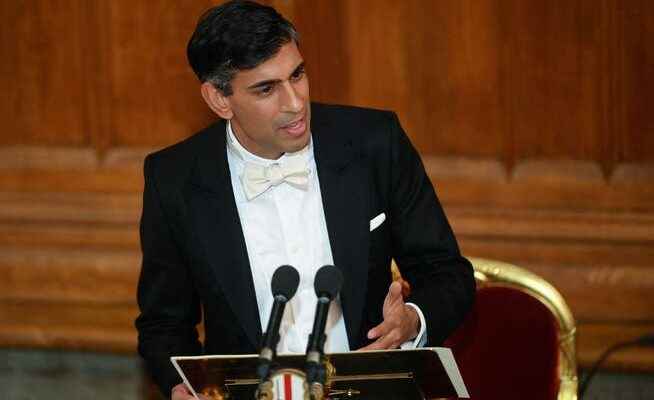The new British prime minister is adopting a more cautious tone towards Beijing than a few months ago. In doing so, Rishi Sunak also implicitly acknowledges the conflicting goals of «Global Britain».
“Robust pragmatism”: British Prime Minister Rishi Sunak outlines his China policy at a banquet in London.
When Rishi Sunak fought Liz Truss to succeed Boris Johnson as British Prime Minister in the summer, he struck distinctive tones. He described China as the “biggest long-term threat” to the UK. He accused then-Secretary of State Truss of rolling out the red carpet in Beijing and idly watching the infiltration of British universities by Chinese agents.
Sunak clearly lost the race to succeed Johnson, only to move into 10 Downing Street after Truss’ forced resignation in mid-October. This week the new prime minister delivered his first keynote address on foreign policy at a banquet in the City of London – although he was much more cautious about China than he was in the summer.
Sunak declared the “golden era” in relations between London and Beijing proclaimed by David Cameron and his Chancellor of the Exchequer George Osborne about a decade ago to be over. He criticized Beijing’s handling of the protests against the zero-Covid policy and the “attack” on a BBC journalist who had reported on the anti-government demonstrations over the weekend. “China poses a systemic challenge to our values and interests as it moves ever further toward authoritarianism,” Sunak said.
But in contrast to Truss and his own statements from the summer, he no longer explicitly described the superpower as a “threat”, but warned against “simple Cold War rhetoric”. Great Britain cannot ignore China’s geopolitical and global economic importance, nor its key role in the fight against climate change. Sunak therefore advocated “robust pragmatism” in relations with Beijing.
Sunak’s tone misled the hawks in the Conservative Party. Former Tory leader Ian Duncan Smith, who is on the Chinese sanctions list, even compared the “robust pragmatism” to Nevin Chamberlain’s appeasement strategy towards Hitler in the 1930s. History teaches that those who appease dictatorships find themselves in dangerous waters, said Duncan Smith.
The media excitement about Sunak’s retreat seems exaggerated, especially since it is not a question of a radical change of course in China policy. Under Boris Johnson, the country had given around 3 million Hong Kongers the opportunity to immigrate to Great Britain or excluded the technology group Huawei from the 5G mobile network. At the same time, Johnson had always tried not to alienate China entirely, despite its bold rhetoric. His Chancellor of the Exchequer at the time, Sunak, had always warned him about the economic consequences.
The fact that Sunak is now pursuing this middle course as Prime Minister also testifies to the conflicting goals of “Global Britain”. Under this slogan, Great Britain has been trying to play a geopolitical role as a great defender of democratic values since Brexit, but also to establish new trade relations all over the world. Sunak is continuing the resolute course of Johnson and Truss towards Russia. But he knows that total isolation from China would entail immense costs. China is Britain’s fourth largest trading partner and accounts for over 6 per cent of UK trade.
After Brexit, the exchange with the EU as the most important trading partner has become more hurdles – the trade figures have fallen accordingly. The US has so far shown no interest in a free trade agreement with London. With the recession looming, Sunak acknowledges that Britain cannot easily afford further economic damage. After the swaggering rhetoric and haughtiness of Sunak’s predecessors, the country would be better off with a touch more realism than pithy campaign rhetoric.
